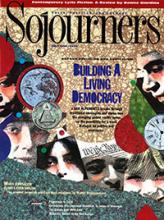"They would make fine servants...With fifty men we could subjugate them all and make them do whatever we want." So Christopher Columbus wrote in his log to describe the Arawaks of the Bahama Islands, the first people he met in "discovering the New World."
The truth is that Columbus didn't know where he was going when he set out across an unknown ocean for Asia in 1492, didn't know where he was when he arrived in the Americas, and didn't know where he had been when he returned to Spain. The only thing Columbus did know was what he wanted -- gold and slaves.
The Arawaks, much like the other native peoples the European invaders would meet, greeted Columbus with great hospitality and sharing. He reported to the king and queen of Spain that the Indians "are so naive and so free with their possessions that no one who has not witnessed them would believe it. When you ask for something they have, they never say no. To the contrary, they offer to share with anyone ..."
Columbus asked his royal benefactors for more financing and promised to bring back from his next voyage "as much gold as they need ... and as many slaves as they ask." He concluded with the appropriate religious benediction, "Thus the eternal God, our Lord, gives victory to those who follow His way over apparent impossibilities."
Thus began an era of conquest, genocide, and slavery which is celebrated by American school children each October on Columbus Day as the great adventure of discovery. And for 1992, the 500th anniversary of Columbus's first voyage, a giant extravaganza is being prepared.
Books like Howard Zinn's A People's History of the United States should become required reading as we also make ready for the great quincentennial cover-up. Zinn tells the awful story of Indians enslaved by the thousands and exterminated by the millions.
Read the Full Article
